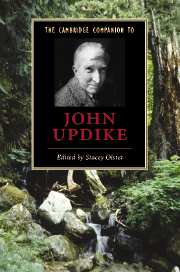Conclusion: U(pdike) & P(ostmodernism)
Published online by Cambridge University Press: 28 August 2006
Summary
A mall had sprung up between Nashua and Pierce Junction, on the site of a dairy farm whose silver-tipped silos I still expected to see gleaming at that particular turn of the highway. Instead, there was this explosively fragmented glitter – chain stores in postmodern glass skins, and a vast asphalt meadow paved with cars.
– John Updike, Licks of Love (2000)ENGLISH CRITIC, TEACHER DEAD / IN WEST SIDE SUBWAY MISHAP, the headline read . . . according to witnesses appeared to fling himself under the subway train as it approached the platform . . . colleagues at CUNY puzzled but agreed he had been under significant stress compiling permissions for his textbook of postmodern narrative strategies . . .
– John Updike, Bech at Bay (1998)My title doubtless will strike many readers as odd, since criticism on John Updike almost never mentions postmodernism. His fiction is most often identified as realist; occasionally, as modernist. And yet as the two epigraphs I begin with reveal, Updike is not unaware of the cultural phenomenon of postmodernism. Updike's relation to postmodernism, however, goes well beyond such passing references. In fact, much of Updike's fiction since A Month of Sundays (1975) reveals a novelist who, if not exactly a postmodernist, has read a number of key poststructuralist texts that inform postmodern poetics and has experimented with postmodern narrative strategies as he chronicles contemporary America. Updike has written novels in the past three decades that intertextually play with the aesthetic past, that are often highly metafictional, and that draw on genres ranging from magic realism (Brazil [1994]) to science fiction (Toward the End of Time [1997]).
- Type
- Chapter
- Information
- The Cambridge Companion to John Updike , pp. 162 - 177Publisher: Cambridge University PressPrint publication year: 2006
- 2
- Cited by



